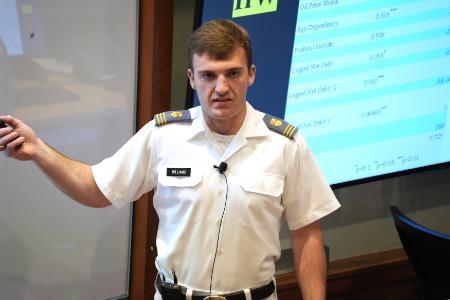Honors Week: Cadet Looks at U.S. Debt

LEXINGTON, Va. March 28, 2025 — American investor and philanthropist Warren Buffett said, “It’s never paid to bet against America. We come through things, but it’s not always a smooth ride.” Harrison Williams ’25, a cadet at Virginia Military Institute majoring in economics and business, researched the wisdom of investing in the United States for his honors project, “Sustainable Debt Limit Estimates for the U.S. and 20 Other OECD Countries.”
The goal of Williams’ project was to estimate the debt level of the U.S and how much money the country can continue to borrow before a default occurs. 
Williams opened his presentation by reminding his audience that the nation was founded in 1776 with the idea of the American dream, allowing people from all over the world to immigrate to the foundling nation, start businesses, and grow wealth to provide better lives for themselves and their families. “One way to grow your wealth in the U.S. is by investing in stocks and bonds. U.S. bonds provide a guaranteed return on investment because the U.S. has never defaulted on debt. However, this guaranteed payment on U.S. bonds may not last forever. The U.S. currently has $36 trillion in gross debt. This is more than the combined debts of China, Japan, France, Germany and the United Kingdom (UK). How much is $36 trillion? Thirty-six trillion one-dollar bills stacked on top of each other will reach the moon and back over nine times, spanning 2,200,000 miles. That’s the distance of traveling from Lexington to San Francisco and back nearly 500 times. To put it in another perspective, between 2020 and 2024, the U.S. government spent $320,000 every second,” Williams stated.
He pointed out that when a country’s interest payments on debt begin to exceed its defense budget, that marks the beginning of the end for that country, and that happened for the United States in 2024. “If you look at countries or empires like the Ottoman Empire, Great Britain, Spain, and France, the beginning of their demise started as soon as their interest payments on debt began to exceed their defense budget. So why is this important? If the U.S. defaults on its debt, the beginning of one of the most catastrophic economic disasters since the Great Depression will occur,” predicted Williams.
His research was based off a paper released by the American Enterprise Institute (AEI) from September 2024, in which the debt limits for the U.S. and 26 other countries in the Organization for Economic Cooperation and Development (OECD) were calculated. “OECD countries are generally considered high-income economies, European countries, Canada, Japan, the UK, and the U.S. I modeled my equations off of that paper, but the main difference between mine and theirs is that they covered a different time period. Their debt limits included variables spanning from 1984 to 2022. My data covered 1996 to 2022. The AEI paper used 26 OECD countries, I only used 21 due to data limitations. I also took the U.S. out of the sample because the U.S. is the greatest economy in the world, so its numbers have a great impact in the sample. With the U.S. taken out of the equation, the debt limits for each country decreases,” explained Williams.
After running a series of complex calculations, comparing gross debt and net debt, Williams completed his research. He shared his concern for the U.S. economy at the conclusion of his presentation. “This debt ratio hasn’t been this high since World War II, and if it’s already this high, what if the U.S. gets in World War III today? Will we be able to afford to fund it in the long run? That is troubling.”
Maj. Steven Landgraf, assistant professor in the Department of Economics and Business who served as Williams’ advisor on the project, stated that a few studies in this field have been criticized for lack of reproducibility. “The fact that Harrison used similar methods and confirmed some results of past research is valuable, but his work also shows that economists should be more careful about using U.S. data to calibrate models meant to inform non-U.S. countries.”
Williams is the son of Lang and Lucy Williams of Norfolk, where he graduated from Norfolk Collegiate School. Following graduation, he hopes to go into the field of finance and eventually become an entrepreneur.
Marianne Hause
Communications & Marketing
VIRGINIA MILITARY INSTITUTE
.svg)
.png)